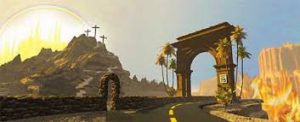Enter Through the Narrow Door
Luke 13: 22-30
Enter through the narrow door DIG: How does Yeshua decide who will make it through the narrow door and who won’t? If God wants all kinds of people to know Him, why isn’t the door wider? In the context of Luke, who are the ones outside (Luke 11:23, 37-53, and 12:9, 21, 45-46, and 13:3)? Why isn’t eating and drinking with Messiah enough?
REFLECT: How do you know whether you are inside or outside the Kingdom? How do you get in (Luke 11:9, 12:31-32) ? Who are you praying for that isn’t in the Kingdom yet? Do you have a “Ten Most Wanted” prayer list? In the end, do you think only a few, many or all people will be saved? Why? What is your proof?
This section begins with a summary of Jesus’ journey to Tziyon. Then Christ went through the towns and villages, teaching as He made His way to Yerushalayim (Luke 13:22). The Rabbi from Galilee made several trips to Jerusalem, but Luke telescoped them to make his point that the Lord had to get to the Holy City of Tziyon to present Himself as the Messiah.1076 The theme for what follows is given by a question. Someone in the crowd asked Him, “Sir, are only a few people going to be saved” (Luke 13:23)? Jesus’ earlier teachings have implied this (to see link click Dw – The Narrow and Wide Gates). In light of the Jewish context in which this question was asked, we must understand it to mean, “Lord, when Messiah’s Kingdom comes, will only a few people enter into it?” The Lord did not answer the question directly, but instead followed it with a series of warnings to the whole crowd.

He said to them: Make every effort to enter through the narrow door (of salvation), because many, I tell you, will try to enter and will not be able to force open the door. Using the analogy of a house being made secure for the night, Christ said that once the owner of the house gets up and closes the door, you will stand outside knocking and pleading, “Sir, open the door for us.” But he will answer, “I don’t know you or where you come from.” The plea will be cut short by a brief and unreasoning reply. Then you will say, “We ate and drank with you, and you taught in our streets.” There were probably many present in His audience who ate with Him and followed the preaching and teaching of the Prophet from Nazareth. But by rejecting His message of salvation, they would hear in the final day, the dreaded pronouncement: I don’t know you or where you come from. Away from me, all you evildoers (Luke 13:24-27)! Those who rejected Him will be excluded from His Kingdom. They will be condemned as evildoers, literally unrighteous.
Then Yeshua spoke directly, telling the crowd that judgment would come on those who refused His message. There will be weeping there, and gnashing of teeth (symbolizing the horrors of eternal judgment), because of the great remorse that they would experience. So, there will be a sense of hopelessness when you see Abraham, Isaac and Jacob (symbolizing Isra’el) and all the prophets in the kingdom of God, but you yourselves thrown out, that is, not allowed to enter the Kingdom (Luke 13:28). These remarks were revolutionary to Christ’s hearers. They believed that since they were physically related to Abraham they would automatically enter into the promised Kingdom.
Jesus is trying to wake up people who think their own good works, or their Jewishness, will guarantee them entry into the ‘olam haba,’ or the world to come. Not only in messianic Judaism, but also in traditional Judaism, there is no hope for that theology. It is true that the Mishna says, “All Isra’el has a share in the ‘olam haba” or the world to come (Sanhedrin 10:1, quoted more fully in Romans 11:25-26). But in subsequent material, which names many categories of Israelites being excluded from the ‘olam haba,’ makes clear that the sense of this pronouncement is that although all Israelites have a special opportunity (as Paul puts it in Romans 3:1-1 and 9:4-5, an advantage), to share in the world to come, they can lose it by not living up to their calling. While neither kind of Judaism offers hope to those who expect ADONAI to overlook their sins without their trusting Him, only messianic Judaism offers the content of trust in Christ that solves the sin problem.1077
Yeshua’s next words, however, were even more revolutionary, in fact devastating, to those who assumed only Jews would be involved in the messianic Kingdom. The Master explained that the Goyim (the Gentiles) would be added to the Kingdom. People will come from the four corners of the earth representing various ethnic groups. From the east and west and north and south, and will take their places at the feast in the kingdom of God (Luke 13:29). This teaching should not have surprised those listening to Messiah’s words because the prophets had often said the same thing. However, the Jews in Jesus’ day believed that Gentiles were inferior to them. When Jesus began His ministry in Nazareth, His teaching of Gentile inclusion had so infuriated the Jews that they picked up stones to kill Him (see Ch – The Spirit of the LORD is On Me).
The Jewish people considered themselves to be first in every way, but they would be last, that is, if they did not individually accept His teaching, they would be left out of the Kingdom. In contrast, some believing Gentiles, considered last by them, would be welcomed into the kingdom of God and would really be first in importance. Indeed there are those who are last who will be first, and first who will be last (Luke 13:30).1078



Leave A Comment